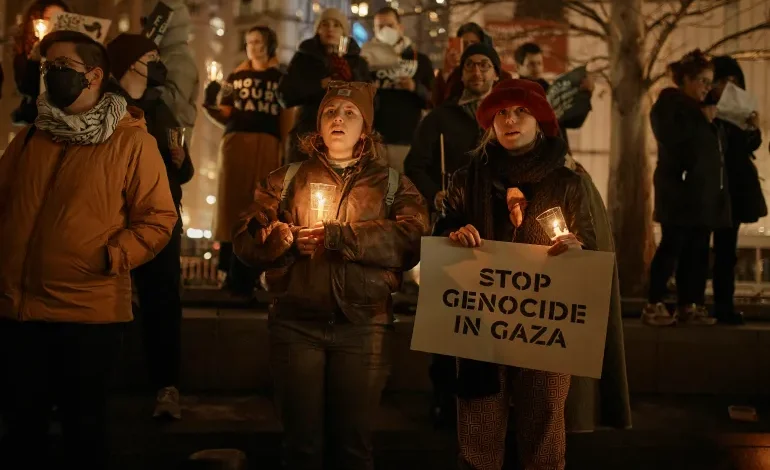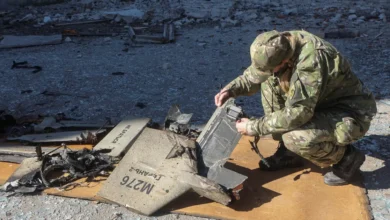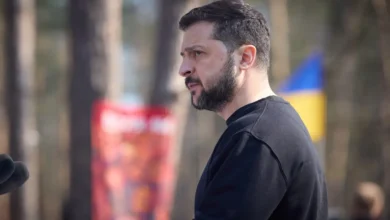In New York, Israeli conscientious objectors find community after ostracism

He feared being called a “mishtamet”. A draft dodger. Someone who shrinks from their responsibility.
But at age 17, Jewish social worker Asaf Calderon made a fateful decision: not to participate in the mandatory military service required of nearly all Israeli citizens.
Instead, he pursued and was granted a medical exemption for mental health reasons. Still, his choice came with a cost.
A soft-spoken man with round glasses and a tender smile, Calderon, 34, noticed that, afterwards, his friends started to seem distant. Members of his family fell out of contact.
He realised his decision had left him a pariah in Israel, even among his loved ones. He eventually moved away to New York City.
“It doesn’t matter why you do it,” Calderon said of becoming a conscientious objector, someone who refuses to participate in military service on ethical or moral grounds. “You are going to get ostracised in a way.”
But the war in Gaza has amplified the pressures he and other conscientious objectors face. Since October 7, Israel has led a military campaign in the Palestinian enclave, with ground forces and aerial bombardment levelling entire neighbourhoods.
The offensive follows an attack on southern Israel that killed an estimated 1,200 people. The subsequent war, however, has left more than 30,000 Palestinians dead, many of them children. United Nations experts have warned of a “risk of genocide”.
“The main thing that I’ve been told ever since the war started, by Israeli people who oppose me, is that I have lost my Israeli-ness. That I’m no longer Israeli,” Calderon told Al Jazeera.
Then came Shoresh. Founded in the United States at the end of November, partly in reaction to the war, the group aims to promote anti-Zionism from the viewpoint of Israelis themselves.
Guy Erez, who has attended Shoresh events, described joining the group as an antidote to the isolation. “Oh my God,” he remembers thinking. “Somebody gets it. Thank God I’m not crazy.”
A tradition of mandatory military service
There are no official statistics about the number of conscientious objectors in Israel — in part because there is no single profile of what a conscientious objector is.
Some, like the members of Shoresh, are anti-Zionists, critical of Israel’s founding as a Jewish nation-state. Others, particularly in Orthodox Jewish communities, object to military service for religious reasons.
Still more oppose certain military activities they might be called upon to perform, like assignments that take them into the occupied Palestinian territories.
The history of mandatory military service — and refusing to comply — goes back as far as Israel itself. In May 1948, shortly after Israel declared independence, its government founded a conscription-based military, drawing largely from existing militias and paramilitary forces.
By the following year, though, mandatory service had become cemented in Israeli law. Today, once Israeli men turn 18, most are expected to serve 32 months in the military. Women, meanwhile, serve 24 months.
Broad exceptions are carved out for certain Palestinian citizens of Israel, religious groups, married people and “those deemed unfit medically or mentally”.
And conscientious objectors can also apply for an exemption before a special military committee. But critics argue relatively few applications are granted, outside of religious grounds or proven track records of pacifism.
Without such an exemption, the consequences of rejecting military service can be severe. Israel’s Defence Service Law stipulates that a citizen’s failure to fulfil their military duty can result in up to two years’ prison time.
If they intentionally “injure or maim” themselves in the process, that prison sentence can jump up to five years.
Since the war in Gaza began, an 18-year-old named Tal Mitnick
Guy Erez, who has attended Shoresh events, described joining the group as an antidote to the isolation. “Oh my God,” he remembers thinking. “Somebody gets it. Thank God I’m not crazy.”
A tradition of mandatory military service
There are no official statistics about the number of conscientious objectors in Israel — in part because there is no single profile of what a conscientious objector is.
Some, like the members of Shoresh, are anti-Zionists, critical of Israel’s founding as a Jewish nation-state. Others, particularly in Orthodox Jewish communities, object to military service for religious reasons.
Still more oppose certain military activities they might be called upon to perform, like assignments that take them into the occupied Palestinian territories.
The history of mandatory military service — and refusing to comply — goes back as far as Israel itself. In May 1948, shortly after Israel declared independence, its government founded a conscription-based military, drawing largely from existing militias and paramilitary forces.
By the following year, though, mandatory service had become cemented in Israeli law. Today, once Israeli men turn 18, most are expected to serve 32 months in the military. Women, meanwhile, serve 24 months.
Broad exceptions are carved out for certain Palestinian citizens of Israel, religious groups, married people and “those deemed unfit medically or mentally”.
And conscientious objectors can also apply for an exemption before a special military committee. But critics argue relatively few applications are granted, outside of religious grounds or proven track records of pacifism.
Without such an exemption, the consequences of rejecting military service can be severe. Israel’s Defence Service Law stipulates that a citizen’s failure to fulfil their military duty can result in up to two years’ prison time.
If they intentionally “injure or maim” themselves in the process, that prison sentence can jump up to five years.
Since the war in Gaza began, an 18-year-old named Tal Mitnick has become the highest-profile instance of military refusal. He surrendered to the Tel Hashomer military base in December for a 30-day sentence.
“I believe that slaughter cannot solve slaughter,” he said in a video recording, before walking inside.
has become the highest-profile instance of military refusal. He surrendered to the Tel Hashomer military base in December for a 30-day sentence.
“I believe that slaughter cannot solve slaughter,” he said in a video recording, before walking inside.










